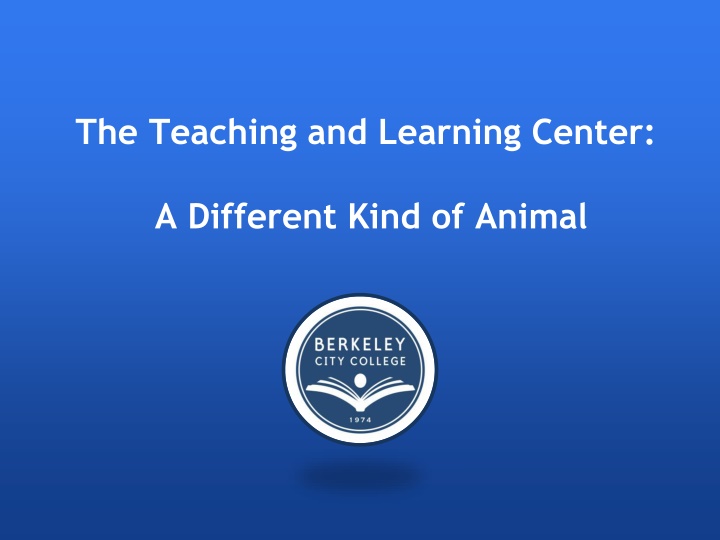
Innovative Teaching and Learning Strategies at a Learning Center
Explore a unique approach to education at The Teaching and Learning Center, focusing on collaborative activities, problem-solving, and teacher-driven initiatives. Discover a range of projects and initiatives aimed at enhancing student learning and engagement.
Download Presentation

Please find below an Image/Link to download the presentation.
The content on the website is provided AS IS for your information and personal use only. It may not be sold, licensed, or shared on other websites without obtaining consent from the author. If you encounter any issues during the download, it is possible that the publisher has removed the file from their server.
You are allowed to download the files provided on this website for personal or commercial use, subject to the condition that they are used lawfully. All files are the property of their respective owners.
The content on the website is provided AS IS for your information and personal use only. It may not be sold, licensed, or shared on other websites without obtaining consent from the author.
E N D
Presentation Transcript
The Teaching and Learning Center: A Different Kind of Animal
Make a group (2 minutes) Turn to the person next to you and share your role at the school. Find another pair in front of or behind your row to make a group of four.
Problem (5 minutes) If traditional staff development were an animal, what would it be and why? Please draw a sketch of the animal.
A Different Kind of Animal Teacher-driven Collaborative Structured and sustained Paid
TLC Activities FIG: Focused Inquiry Group APPLE: Action Plan Project for Learning Excellence
Sample FIG Questions (2009- 2016) BIOL/GEOG: What kinds of active learning activities best help students learn scientific concepts? COUN: How can we improve students' experiences at their first orientation at BCC? ENGL: How do we help students to improve their skills conducting research and writing research papers? MMART: Would shorter certificates result in more retention and persistence in Multimedia Arts? MATH: How can using narratives in math reduce anxiety and increase retention/completion? ESOL: How can we best incorporate technology to meet our language learners needs?
TLC Activities POP: Peer Observation Pool
A Different Kind of Animal Design Lab Experimental Trust and vulnerability Paid
TLC Activities LESSON STUDY: Instructional Design
TLC Activities DIY: Do-It-Yourself Experiments
Sample TLC Projects (2017-2018): An Administrator s Point of View TLC PROJECT 1 (Faculty Inquiry Group): Faculty Lead Organizer: English Basic Skills Faculty Research Question: Why are some basic skills students not applying the instruction they receive in class to their essays even though they have ample opportunity to practice developing their skills in the lab section of the course, held in the computer lab and equipped with their instructor as well as embedded writing coaches? TLC PROJECT 2 (Faculty Inquiry Group): Faculty Lead Organizers: English, Library, and Counseling Faculty Research Questions: How do we become a trauma-informed college through an awareness of our co-workers and our students' ACEs (Adverse Childhood Experiences)? What are the practices and policies we can implement so we are not re-traumatizing our students, faculty and staff? TLC PROJECT 3 (DIY Role-Playing History and Performance) Faculty Lead Organizers: Art and Humanities faculty QUEER HISTORY TOURS AND STREET PERFORMANCES: This large-scale project offers a series of performance events, curriculum re-design, and walking tours for two Humanities courses (Popular Culture and Introduction to the Humanities) and across several disciplines that brings to life San Francisco s rich queer history on the streets where it all began.
Sample TLC Projects (2017-2018): An Administrator s Point of View
Sample TLC Projects (2017- 2018) Faculty Inquiry Group (FIG): English, Counseling, and Library faculty Research Questions: How do we become a trauma- informed college through an awareness of our co- workers and our students' ACEs (Adverse Childhood Experiences)? What are the practices and policies we can implement so we are not re-traumatizing our students, faculty and staff?
Sample TLC Projects (2017- 2018) Faculty Inquiry Group (FIG): English faculty Research Question: Why are some basic skills students not applying the instruction they receive in class to their essays ...even though they have ample opportunity to practice developing their skills in the lab section of the course, held in the computer lab and equipped with their instructor as well as embedded writing coaches?
Sample TLC Projects (2017- 2018) DIY/LESSON STUDY: Art (Seth Eisen) and Humanities faculty (Dylan Eret) QUEER HISTORY TOURS AND STREET PERFORMANCES: This large-scale project offers a series of performance events, curriculum re-design, and walking tours for two Humanities courses (Popular Culture and Introduction to the Humanities) and across several disciplines that brings to life San Francisco s rich queer history on the streets where it all began.
Solution In the same group, commit to a FIG, POP, or DIY activity. For this activity, how would you take a risk, honor the expertise of your group, or share something vulnerable about your professional role or life with a colleague in a safe and creative way? How could you structure and sustain this conversation over time?
